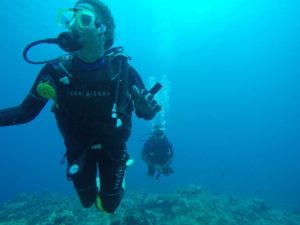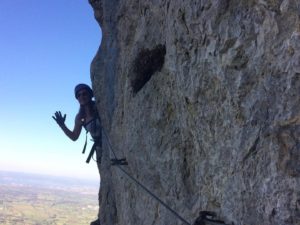Andrea is a phenomenally dynamic and giving person, full of energy and inspiration. She enjoys learning and sharing her knowledge with others to help advance the physical therapy practice as a whole. Andrea has been working on a voluntary basis at Physiopedia for several years and is now working on her doctorate on ethical practices in our profession. Please congratulate Andrea on her achievements, her ambitions and important contributions to Physiopedia . Andrea is our top contributor for the month of August 2020. Well done Andrea, well deserved!
Your name: Andrea Sturm
Time active at Physiopedia: In 2017 I started to volunteer for Physiopedia . I started with the creation of an ethics program for Physioplus which in May 2017 consisted of four individual courses. The courses were officially launched a year later.
Current role at Physiopedia: Learn to be an architect at Physioplus .
Where did you go to university / college? I did my basic training at the PRÄHA Physiotherapy school in Kerpen. Since I enjoy learning and am interested in many different areas, I also have a master's degree in "Spiritual Theology in the Interreligious Process" from the University of Salzburg and another in natural science education, from the Interuniversität Graz . I am currently doing my doctorate in education in Graz.
Where do you work? In 2009 I founded a private physiotherapy practice in Hallein, a small town near Salzburg, specializing in neurology and paediatrics . I handed the clinic over to a dedicated colleague last year before giving birth to our son Patrik. At the moment I am on maternity leave. I am open to what the future holds for me afterwards. Describe your role: As a clinician, I love working with patients, both children and adults, with severe disabilities . This is the place where I feel I can contribute the most to an individual's ability to participate in society, improve the quality of life and, luckily, often make progress. My heart also belongs to those who are marginalized, sometimes the neglected – and therefore become invisible to society. Individuals with chronic, progressive neurological diseases that hinder and isolate them and their families over the years in the course of their condition. I spend half of my clinical time seeing patients who are bedridden or in a wheelchair at home and in many cases offer therapy for as long as necessary or until they die.
As a professional ethics teacher, I'm not entirely sure who actually learns the most from whom (I feel like both a teacher and a student!). I am often inspired and touched in many ways by the international participants in the Physioplus courses especially firsthand about cultural differences, but also similarities (e.g. in health systems or Greetings from the patient) where I did not expect them at all.
And as a researcher with a focus on ethics and ethical practices I am enthusiastic about new topics or areas discover using my teaching and clinical experience. Because both my research and my clinical background inspire me to better understand these processes and translate them into accessible practices. The older I get, the more I can see how different aspects and factors fit together and how they really fit together.

What is the best thing about being a physiotherapist? To me it makes a difference in a person's life. If someone I work with feels that my contribution changed something relevant in their life, or in the case of a child, if I have been able to put things on the right track for their life to move in Developing a better direction or a future worth living in, that really makes me happy. I can hardly find the words to describe this. Doing meaningful work that can change someone's life is the most rewarding part of working in our field for me.
I know these are "big words" but in the case of someone who has had a stroke or a family who has a child with has developmental disorders or genetic defects, you as a healthcare professional are often responsible for guiding them first on their journey and then guiding them later until they can travel alone. I am really grateful for my patients' trust in my abilities and my professional responsibility to support them on their journey.
What are some of the more difficult things about being a physiotherapist? While I am working in palliative medicine I too have difficulties, the often unbearable suffering of my patients that I cannot take home with me. I've seen it a couple of times, when treating either people younger than me and also children, that I had to take my time when they died because it really affected me. But I think that's the price paid for the privilege of bearing testimony about someone's life. I never understood the role of the professional as a protective shield, but learned to accept life with all its complexities and challenges.
 What are some of your professional passions? Hmm, good question. I am so excited about so much! Professional ethics for example, is an area in which I cannot get enough. Once I sink my teeth into something interesting, I have to dig into it until I feel like I really understand the topic. it's the correlation and the effects. Unfortunately, I hardly have enough time to quench my thirst for learning. But my little son is now teaching me how to let go of every attempt at perfection.
What are some of your professional passions? Hmm, good question. I am so excited about so much! Professional ethics for example, is an area in which I cannot get enough. Once I sink my teeth into something interesting, I have to dig into it until I feel like I really understand the topic. it's the correlation and the effects. Unfortunately, I hardly have enough time to quench my thirst for learning. But my little son is now teaching me how to let go of every attempt at perfection.
What are some of your personal passions? Oh, I'm an absolute sports addict! In the summer I climb, dive and fly with my partner. Last year I discovered stand up paddling, which I did until the end of the 7th month of my pregnancy. I've also been a passionate runner for 25 years. In the winter months I also go backcountry, cross-country and downhill skiing. And I love reading good literature and learning about other cultures, countries and wildlife.
What advice would you give to a freshly graduated physiotherapist? Do not underestimate the value of a respectful relationship with your patient based on mutual trust and understanding. Professional techniques and knowledge are one thing, but getting real and human is just as important. Especially in situations where time and money seem to be more important than people and connections. Challenge what you have in front of you when you enter the job and if you are not satisfied with it, actively contribute to the change you would like to see.
Where do you see yourself in 5 years? Hopefully on the first day of school for our son. For the rest, I stopped making plans as everything I once thought turned out to be completely different. That's why I decided to go with the flow and see where life will lead me. I am sure I will not get bored!
 What's the best part about being a Physiopedia volunteer? To give something back to my job that has given me so much over the years. Learn from others on an international level and have fun together. What is unique about Physiopedia is Rachel's ability to provide the space someone needs to be at their best. You certainly don't find that very often.
What's the best part about being a Physiopedia volunteer? To give something back to my job that has given me so much over the years. Learn from others on an international level and have fun together. What is unique about Physiopedia is Rachel's ability to provide the space someone needs to be at their best. You certainly don't find that very often.
How did it help you to advance your professional development / career as a volunteer at Physiopedia? It is their (Rachael & Tony!) Fault that I am now working towards a PhD. While I was creating a worldwide ethics course I asked myself: Why not do research on ethics on an international level?
One thing led to another, and here I am now – in the middle of an exciting journey! I would never have thought about it, if not the preparations of the ethics program for Physioplus .
]]
What are your hopes and aspirations for Physiopedia? Physiopedia will be able to provide / create an online graduate or postgraduate university program that is accessible and feasible for people from different economic and cultural backgrounds. You have already laid the foundation for worldwide physiotherapy training, and I very much hope that Physiopedia will continue to move in this direction.
What is your favorite course at Physioplus? The course for cerebral palsy . I was so excited that I just couldn't stop learning! I rushed through the program like there's no tomorrow!
Would you like to say something else? Yes. If anyone is interested in participating in our current ethics study, I would love to hear from you. We are looking for colleagues from all over the world who are willing to share their experiences with ethical decisions in an online interview. Click here if you would like to participate in the study or to learn more about the study.
Click here to learn more about the Ethics Program for Physioplus.
How do I become a volunteer?
All of our volunteers complete the volunteer orientation course, the next course starts on Monday, September 7th! After successfully completing this course, all of our volunteers spend six months on the content development team. This consolidates everything you learned in the course and gives you the opportunity to demonstrate where your unique skills and interests lie. After your six month review, you will be assigned a specific role that matches the skills you have demonstrated, as well as your individual qualifications, experience and interests. If you would like to take this course, please click the button below and join us on an amazing journey!
Register here for the next volunteer orientation course
